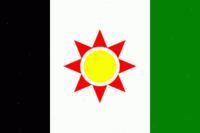Al-Basra
Formerly the southernmost region of ‘Iraaq, Al-Basra declared its independence in the wake of the environmental devastation inflicted on its land during the Perso-‘Iraaqi War of the 1980s and the Gulf War (‘Iraaqi invasion of Kuwayt) in the early 1990s at the behest of foreign agitation in the region. Another important cause of the secession was the oppression suffered by the mostly Shia of Iraaq at the hand of Saddaam Hussayn and his Sunni powerbase based in Baghdaad. After overt meddling by the Republic of Oregon, a small cadre of western-educated intellectuals declared an "ecotopian republic" (whatever that is) who attempted to hoist a wholly foreign ideology onto their devout Shia constituents. To this end, so-called "peace-keepers" sent in by Oregon assisted them in their failed effort to build an entirely new state from scratch after the fall of Saddam Hussayn.
The effort, however, was ultimately in vain. The ideology never caught on amongst the masses and was perceived to be as further western meddling in the Middle East. Ecotopianism was quickly deemed a foreign influence by the country's strong Shia ulama who were instrumental in the resistance movement and uprising that ultimately overthrew Hussayn. Oregon and its local collaborators had an obsessive compulsion to impose laïcité on the new, artificial country and greatly alienated the Shia religious institutions of Iraaq. The new, western-backed intelligentsia tried to spin their takeover and minority rule as a revolutionary effort, but the people of southern Iraaq simply did not buy the line. Further alienating the people, they even tried to paint the people of Iraaq not as Arabs, but as merely arabized Sumerians. This new intelligentsia even opted to name their fiefdom's head of state not a president (or 'رئيس' or "raʾīs" in Arabic), but as a lugal (لوغال), the Sumerian word for "king."
The final straw for the Iraaqi people was the illegitimate state's funding of ecoterrorism and routine incursions into Iraaq in an effort to permanently destroy the country's oil-production infrastructure. Finally, in March 2004, the new, post-Hussayn Iraaq fought back and formally declared war on Basra. The Shia majority of the country rose up and threw out their western-backed leaders, executing the acting "lugal." Although the League of Nations quickly turned its back on Iraaq and sanctioned it for its war with al-Basra, the country was re-absorbed back into Iraaq to the cheers of the Shia majority. Since the fall of Hussayn and the colony of "the Ecotopic Republic of al-Basra," there has been a Shia renaissance and a partnership of the ulama with Iraaqi nationalists and leftists. New rounds of conversion to Shiism from Sunnism have exploded across the reunited country, much to the chagrin of the Otttomans and Saudis who were much more sublte in their powerplays in the post-Hussayn than the overtly imperialist Oregon.
The military occupation of Basra by Oregonian forces was such a scandal back home that a wave of violent protests rocked every major city of the country and brought down the reigning coalition. Ecopotism is now moribund as an ideological movement the world-over and the new parties who govern Oregon in the 2010's and 2020's have all pivoted to an isolationist stance.
[SB]
Geography
Borders
Northwest: Iraaq.
Southwest: Bedouin Free State.
South: Saudi Arabia, Kuwayt.
Northeast: Persia.
